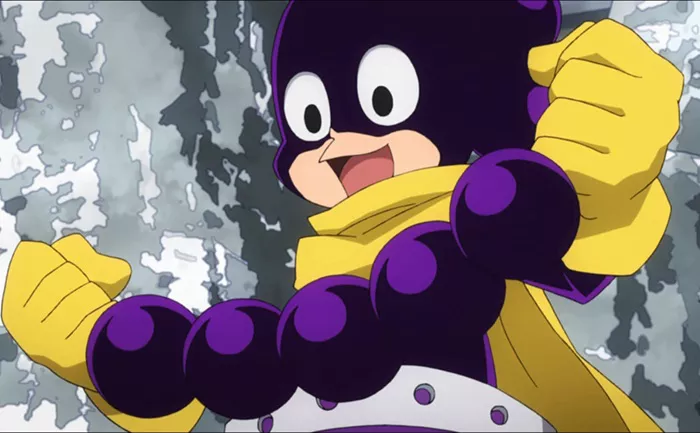Minoru Mineta, one of the most controversial characters in My Hero Academia, has sparked significant backlash from fans, particularly for his portrayal of a “pervert” archetype. The character’s sexually charged antics have long been a point of contention among viewers, especially in Western audiences. However, Brina Palencia, the English voice actor behind Mineta, has come forward to defend the character, emphasizing his immaturity and age. In a recent social media post, Palencia called for fans to reconsider their harsh judgment of Mineta, pointing out that his behavior stems from his youth and inexperience.
Mineta’s Controversial Behavior
Mineta, a student at U.A. High School, frequently engages in behavior that many fans find troubling. Known for his lecherous remarks and attempts to flirt with his female classmates, Mineta’s actions are often depicted in a comedic light but have raised questions about the portrayal of consent and harassment in anime. His behavior, which often involves making crude comments or physically harassing other characters, has led many viewers to label him as a “sex pest.”
In My Hero Academia, these moments are typically played for laughs, yet for many fans, they go beyond mere humor, revealing deeper concerns about the character’s lack of respect for boundaries. His antics have drawn widespread criticism, particularly from those who feel that the character perpetuates harmful stereotypes about young men and their interactions with women.
Brina Palencia’s Defense of Mineta
In response to the intense criticism, Palencia took to Instagram to voice her support for Mineta, defending the character’s actions as a result of his immaturity. “He’s a literal child who hasn’t gone through puberty yet,” Palencia wrote in a recent Instagram reel. She further highlighted that other adult characters in the series exhibit similar, if not worse, behaviors without facing the same level of backlash.
Palencia’s remarks suggest that Mineta’s actions should be understood in the context of his age and development, pointing out that he is still a child learning about social dynamics. The voice actor also addressed the hostile tone of some fan reactions, including death threats aimed at the character, and urged fans to reconsider the impact of their words on younger viewers who might relate to Mineta.
A Broader Look at the “Pervert” Archetype in Anime
Mineta’s behavior, while divisive, is not unique in the world of anime. The “pervert” archetype has a long history in the medium, with characters like Master Roshi from Dragon Ball and Denji from Chainsaw Man embodying similar traits. However, these characters often escape the level of scrutiny that Mineta receives. Denji, for example, while also portrayed as a lecherous character, is seen more as a fool who is often surrounded by powerful figures, which may reduce the perception of him as a “pest.”
Mineta, on the other hand, is frequently viewed through a more negative lens due to his persistent behavior and lack of significant character growth. While other characters might be forgiven or overlooked for their similar actions, Mineta’s antics often overshadow his more redeeming qualities, particularly for viewers who are sensitive to issues of harassment and consent.
Why Mineta’s Behavior Draws Criticism
Despite being a relatively minor character in the grand scope of My Hero Academia, Mineta’s behavior has sparked more controversy than perhaps any other. As a member of Class 1-A, his primary role is to provide comic relief, yet his interactions with female characters often go too far for many fans. In recent years, as societal attitudes toward sexual harassment and boundaries have evolved, Mineta’s actions have become increasingly difficult for some to tolerate.
Moreover, Mineta is not viewed as a particularly skilled or useful hero-in-training, which contributes to the lack of empathy for his character. In contrast, other characters who exhibit less-than-ideal behavior may receive more understanding because they show growth or contribute meaningfully to the storyline. For Mineta, however, his antics are often seen as a distraction from the more serious themes of the series.
Palencia’s Call for a Balanced Perspective
While Palencia’s defense of Mineta has its merits, it does not excuse his worst behavior. However, her point that the hate directed at Mineta might be disproportionate is worth considering. Fans should keep in mind that Mineta, like all the students at U.A. High, is still growing and learning. His behavior, while troubling at times, is part of his character arc, and it’s important to remember that he is, fundamentally, a fictional creation.
As Palencia suggests, it’s crucial to balance criticism with empathy, particularly when it comes to younger, less-developed characters. The fact that Mineta is a child who has not yet reached maturity can offer some context for his actions, even if they are uncomfortable to watch.
Conclusion
The debate over Mineta’s character is far from settled, and his actions will likely continue to divide My Hero Academia fans. However, Brina Palencia’s defense highlights an important perspective: while Mineta’s behavior is problematic, it is not without reason, and it should not be treated as an unforgivable flaw. As viewers continue to engage with the series, it’s essential to remember that, much like real-life children, Mineta’s character is still in the process of development. Fans are encouraged to reflect on the complexities of fictional characters and the broader cultural conversations surrounding the portrayal of behavior in anime.
Related Topics
10 Best Female Detectives in Anime, Ranked
10 Best Starter Pokémon in the Pokémon Anime
Who Is Detective Conan Kyogoku?


